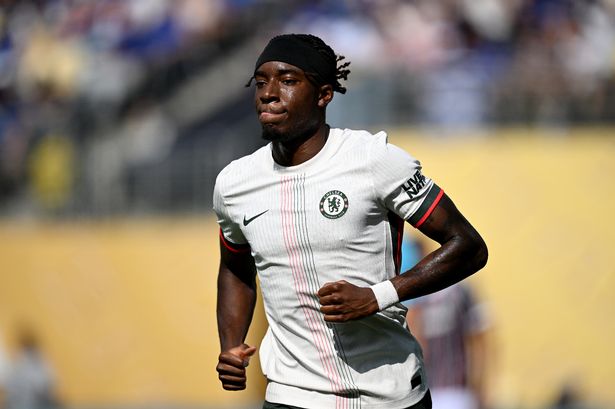Football transfers frequently generate debate, but few scenarios spark as much internal conflict for a club as considering selling a promising young player to a direct rival. Reports suggesting Chelsea are in talks with Arsenal regarding the sale of winger Noni Madueke for a fee potentially approaching $70 million have done exactly that, forcing onlookers to scrutinize the logic behind such a move, particularly in the context of Chelsea`s publicly stated long-term strategy.
For several years, the narrative emanating from Stamford Bridge has centered on building a core of young, high-potential players intended to grow and succeed together over an extended period. This vision, articulated by ownership, underpins a significant investment in youth. Against this backdrop, the potential departure of Madueke, a player acquired relatively recently at a younger age, appears counter-intuitive.
While discussions are reportedly at an early stage, the mere contemplation of this transfer raises a fundamental question: Does selling Madueke align with Chelsea`s strategic objectives, or does it represent a deviation driven by other factors?
Madueke`s Ascent: Beyond the Raw Numbers
Surface-level statistics – goals and assists – sometimes paint an incomplete picture of a player`s impact, especially for developing attackers. Noni Madueke`s recent performance trajectory is a case in point. While his raw output in the 2024-25 season (11 goals, 5 assists across all competitions) might not be statistically overwhelming, a deeper dive into objective data reveals a player making significant strides.
Advanced metrics highlight a crucial improvement in his ability to get into dangerous scoring positions and generate high-quality chances. His shots per 90 minutes ranked among the league`s elite wingers. Critically, the *quality* of these shots also saw a substantial increase, moving closer to the league average for conversion difficulty. Data visualizations indicate a greater proportion of his attempts originating from central areas within the penalty box – precisely where goals are more likely to be scored. This isn`t just volume; it`s smarter, more effective attacking play.
Furthermore, Madueke`s ball-carrying ability has become a genuine asset. Progressive carries, defined as moving the ball significantly closer to the opponent`s goal, place him in company with some of the Premier League`s most dynamic wide players. Even his expected possession value added – a metric assessing how individual actions contribute to a team`s likelihood of scoring – registers impressively high for a player tasked with such direct attacking responsibilities.
Admittedly, the subjective “eye test” can sometimes lead to differing conclusions. Watching a winger attempt to beat a defender multiple times might appear inefficient to some. However, the objective data provides a more dispassionate assessment: Madueke is increasingly succeeding in actions that statistically correlate with positive offensive outcomes.
The Chelsea Calculus: Money, Attitude, and Risk
Given this clear upward performance trajectory, the rationale behind Chelsea`s willingness to entertain offers, particularly from a rival, becomes the central puzzle. Two primary factors likely play a role:
First, reports have periodically surfaced regarding perceived attitude or work rate concerns, including public comments from previous coaching staff. While valid points for internal management, the objective data suggests these concerns have not demonstrably hindered his on-field development and positive impact in the most recent season. It presents a slightly ironic scenario: a player whose performance metrics are steadily improving is potentially offloaded due to off-field perceptions.
Second, the financial aspect is significant. A fee of around $70 million represents a substantial return on their initial investment and provides significant capital. The argument follows that this money could be reinvested to acquire players deemed a better fit or higher caliber. However, this introduces a considerable element of risk. As statisticians working in football analytics have noted, even transfers with seemingly high confidence levels often yield successful outcomes only about half the time.
Trading a player who has demonstrated concrete, data-backed performance improvement and is still on an upward curve for the uncertainty of a new signing, regardless of perceived potential or current status, is a calculated gamble. Selling him to a direct rival adds another layer of strategic complexity, potentially strengthening a competitor with a player who is statistically proving his worth.
Conclusion: A Gamble Against the Data
For a club committed to nurturing a young core and building long-term stability, offloading a player like Noni Madueke at this juncture seems fundamentally at odds with that mission. His performance data indicates he is precisely the type of asset they should be looking to retain and develop further. While the financial injection is appealing, the risk of failing to replace his burgeoning positive impact with new signings is substantial, especially given the inherent unpredictability of the transfer market.
From an analytical standpoint, sanctioning this transfer appears less like a strategic masterstroke and more like a potentially significant error, ignoring objective evidence of development in favor of alternative considerations. Time will ultimately tell, but the data currently available suggests Chelsea may regret letting Noni Madueke leave, particularly if he continues his ascent in the colors of a London rival.

